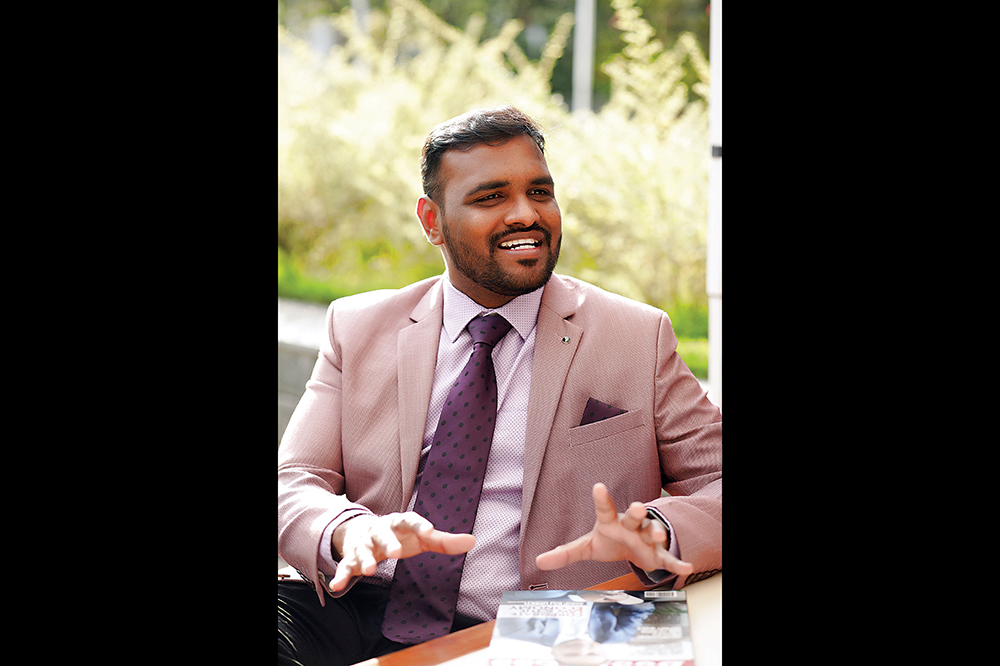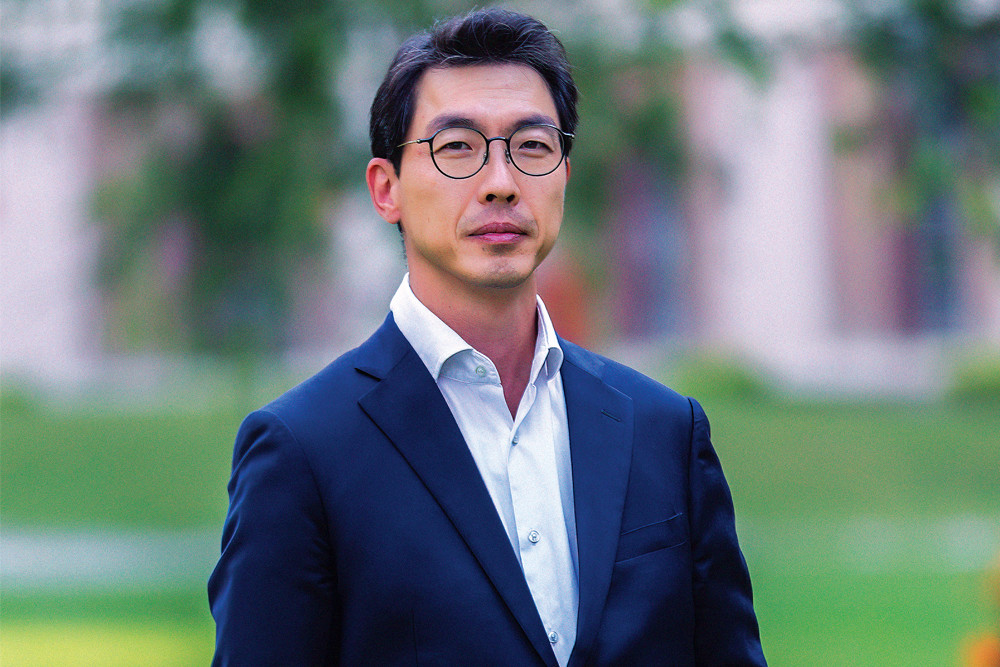
Mustakim Sayyad
Lead –Nepal, Bangladesh, Bhutan and Sri Lanka Roche Diagnostics India
Mustakim Sayyad, who is the Lead for Neighbouring Countries including Nepal, Bangladesh, Bhutan and Sri Lanka for Roche Diagnostics India, has been involved in different capacities in the medical field for over a decade. Starting his career as an Implant Trainee with Siemens in Mumbai, he is today looking after the business of Roche in four countries based out of India. Sayyad has been overseeing the Nepal market for the past 1.5 years. He was recently in Kathmandu as a member of the Swiss delegation that comprised representatives of various companies based in Switzerland. During this fact-finding mission, Business 360 got the opportunity to speak to him about various aspects of the medical sector and Roche in particular. Excerpts:How would you like to describe Roche as a company and what has the business been like in the South Asian market and Nepal particularly?
We are a company that focuses on quality diagnosis, so whenever anybody asks me about Roche the first thing that comes to my mind is quality. The other aspect we emphasise is doing what patients need next. Roche is a very innovative company and we always look at the global healthcare scenario and develop products that are required by patients for the next step of their treatment. For instance, during Covid our R&D plants were involved in various research programmes but once the pandemic struck we quickly realigned our marketing and business plans so that we could spend more on R&D of Covid-related products. We were one of the first companies to come out with Covid PCR test, antigen test and also antibody test. Roche as a company has two divisions with one focusing on the diagnostic side and the other which deals with pharmaceutical drugs. From the pharmaceutical side too, we were the first to launch an antibody cocktail and drugs like Actemra which were globally used for treating Covid patients. Moreover, during the first wave of the pandemic when there was a crunch of testing kits in Nepal, we provided 30,000 kits free of cost through the Swiss Embassy in Kathmandu, and in the second wave, we provided 40,000 kits. Regarding the business aspect, our business in the entire Asian market has been immense and we are leaders in our segment in the entire South Asian market. In Nepal too, we have recurring business of around $1.4 million every year. What people have to realise is that Roche is a company that believes in quality, hence our brand has always been associated with the quality of products that we introduce in the market. We are not there in the mass product category so we may not be present in all the laboratories but we are present in the Class A and a few Class B labs.Roche has been talking about delivering sustainable value for quite a number of years now. What does that exactly mean and how does it contribute to society?
We could take Nepal as an example for that. The National Public Health Laboratory (NPHL) here which is a reference lab has been using our system for HIV screening test. A few years back, Nepal had high prevalence of HIV which has drastically dropped in the last few years. This has been possible due to the extensive screening that is conducted these days and other measures that have been taken to contain the spread. We could say that this has been possible because with the help of our donations we installed a molecular system about nine years back at NPHL and it is still working well with the quality of results that are exactly the same as it was when we installed the system. In fact, the system has been working flawlessly without any major breakdown till date. So, this is one example of sustainability. On the other hand, when we look at the bigger picture or longer-term sustainability, then it is about giving something to the patient that will have a positive impact on their life.What is your view on accusations on the pharma industry being responsible for ailments due to side effects of medicines?
This is a completely wrong belief because when companies are preparing or manufacturing a drug or investing in R&D, it is not because they want to push their drugs into the market. We are doing so because there is a need for those medicines. There are a lot of people dying due to one or the other cause and there are doctors who are asking for some kind of medicine. That’s why pharma companies are manufacturing different types of drugs. Again, I would like to give an example; at Roche we have personalised therapy. Earlier, if you remember if a patient had lung cancer and there was another patient who had let’s say breast cancer. Both the patients used to be treated similarly because what people believed was that both were cancers so we could treat them in a similar manner. But now, and with the help of other pharma companies too, the market has grown really very well where even if there are two people with the same type of cancer, they can be treated separately through personalised therapy. That kind of technology has been brought in, that type of diagnosis and plus the therapy. With this type of therapy, you can personalise treatments and extend a person’s life span. At present, patients with lung cancer survive for seven years. Without pharma companies, this would not have been possible.How much does Roche invest in R&D and are there any specific types of medicines that the company is focusing on?
Our major focus at present is on oncology because globally the burden of oncology is increasing. There are new products from the pharma side. And from the diagnostic side also, it is majorly on human health, Alzheimer’s and oncology. Roche works on end-to-end solutions. For example, if a person wants to be treated, they have to be diagnosed first and then provided treatment and then they also need to be monitored. We play in all three areas. Coming to numbers, we invest $12.2 billion annually in R&D, which is nearly 20% of our revenue. Very few companies reinvest so much money from their revenue into R&D.Does access to health only mean being able to reach a hospital or does it mean more?
Overall, 70% of the clinical decisions that doctors make depend on diagnostics. Gone are the days, when a doctor would usually only feel your pulse and take the heartbeat and say okay you might have this, sort of trial-and-error method. Now doctors are totally relying on diagnostics. Now people do visit hospitals quite regularly, and accurate diagnostic is very important. I would say access to health means not only access to a doctor for consultations but also access to proper diagnostics.What is your general overview of the global pharma industry and Roche in particular?
Pharma-wise I can tell you globally the industry is growing. You will see that most of the companies are moving towards new molecules where you will see some companies are developing molecules which are a combination of other molecules. If you want to treat a heart patient it will work on your blood pressure also, and it will act as a blood thinner also. So, whatever is needed by a cardiology patient, everything will be done by a single pill. Pharma is moving towards a more consolidated and personalised treatment rather than the earlier system of generalised treatment, and nearly everyone is working towards that. Particularly in Roche, we are focusing more on the high medical value aspects of diagnostics and drugs in pharmaceuticals because we feel that’s where future patients will need more attention.Do you believe that expensive hospitals and doctors mean better healthcare?
Let me be very honest, it is quite a tough question to answer. But what one has to realise is that there is value to everything. There is a cost to everything. We have all probably experienced that if you want to use good quality equipment or visit a good quality doctor or if you want a quality therapy or surgery or cure, it comes at a cost. That is because it has to be properly organised, well planned and then only done. I can particularly talk about Roche diagnostics: we are premium. We are not very economical in the market but I can tell you, people trust the quality of Roche. They literally say that if my sample is being run on Roche machine then that’s good and I am ready to pay premium. That’s due to the quality.How is Roche performing in Nepal?
There are two parts. One is pharmaceutical which we are not present in Nepal because we are very new to this market. We are trying to gauge if we can bring our pharma and diabetes care side too into Nepal directly or through a distributor. We are analysing that. The second is from the diagnostic side and we are already present here not as a direct subsidiary but we have a local partner here who markets the Roche diagnostic products here. We do business of about 1.4 million Swiss Francs annually here. We are present in the Class A and B labs which are the top-level labs and in hospitals too. We are considered a quality player and we have been in Nepal for the last 16 years. It is one million now but we have high expectations from this market because access to diagnostics is growing, the disease burden for the country is growing and more people are ready to use it as a preventive measure. READ ALSO:- 'If you look at the Doing Good Index there are four sets of indicators'
- ‘I was recently at a banking and finance conference in Kathmandu and it was an eye-opener for me’
- ‘We wanted to do something meaningful to raise the bar of sports in Nepal’
- ‘As long as Gulf governments subsidise their airlines, we can never talk of a level playing field’
- ‘All stakeholders need to come together and work on innovative schemes’
Published Date: January 4, 2023, 12:00 am
Post Comment
E-Magazine
RELATED Face 2 Face



.jpg)
.jpg)
.jpg)